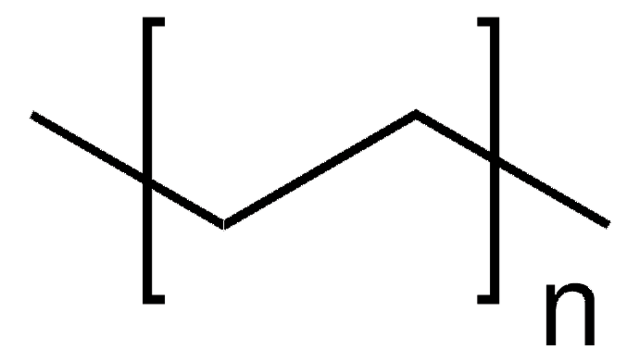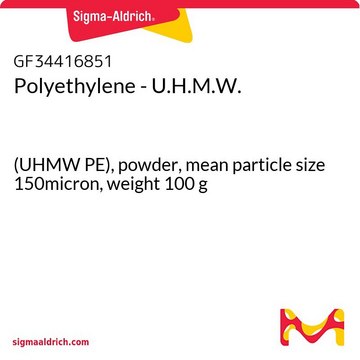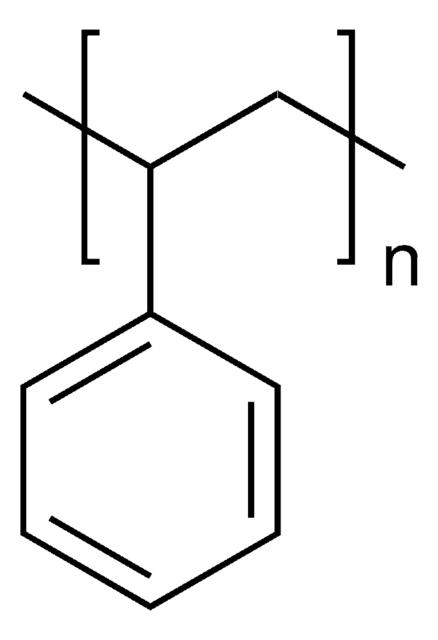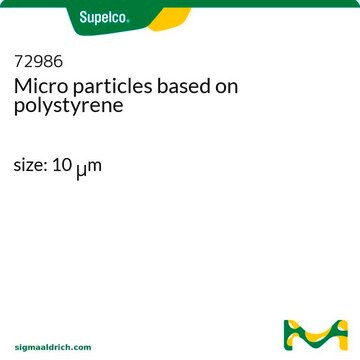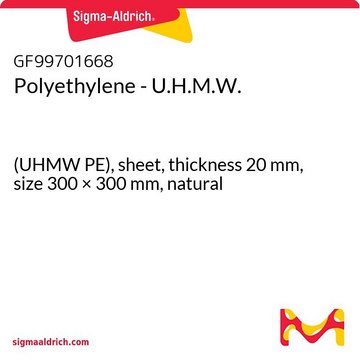434264
Polyethylene
Ultra-high molecular weight, surface-modified, powder, 125 μm avg. part. size
Sign Into View Organizational & Contract Pricing
All Photos(2)
About This Item
Linear Formula:
H(CH2CH2)nH
CAS Number:
MDL number:
UNSPSC Code:
12162002
PubChem Substance ID:
NACRES:
NA.23
Recommended Products
Quality Level
form
powder
mol wt
(Ultra-high molecular weight)
avg. part. size
125 μm
mp
146 °C
transition temp
Tm (DSC) 146 °C (at peak)
density
0.94 g/mL at 25 °C
SMILES string
C=C
InChI
1S/C2H4/c1-2/h1-2H2
InChI key
VGGSQFUCUMXWEO-UHFFFAOYSA-N
Looking for similar products? Visit Product Comparison Guide
Related Categories
Application
Additive to unsaturated polyesters, epoxides and other polymers to impart the unique properties of UHMWPE. Used in industrial parts, coatings and wear surfaces at 10-40 wt. %.
Features and Benefits
Polar surface groups assist chemical and physical bonding to matrix material. Contributes superior abrasion resistance, reduced coefficient of friction, enhanced tear strength and improved moisture resistance. Easier to process in particle form than molten UHMWPE.
Physical form
Particle surface is oxidized to contain acid and hydroxy groups.
Storage Class Code
11 - Combustible Solids
WGK
WGK 3
Flash Point(F)
Not applicable
Flash Point(C)
Not applicable
Personal Protective Equipment
dust mask type N95 (US), Eyeshields, Gloves
Choose from one of the most recent versions:
Already Own This Product?
Find documentation for the products that you have recently purchased in the Document Library.
Customers Also Viewed
Eliandra Mirlei Rossi et al.
Journal of infection in developing countries, 7(3), 229-234 (2013-03-16)
Contaminated sponges might lead to cross-contamination in kitchens since they can transfer microorganisms to surfaces where microorganisms can survive for hours or days and contaminate food. The main objective of this study was to evaluate the transfer and the survival
Morteza Meftah et al.
The Journal of bone and joint surgery. American volume, 95(13), 1193-1197 (2013-07-05)
Ceramic femoral heads produce less wear of the opposing polyethylene than do metal femoral heads in wear simulation studies. This is a matched-pair analysis of the wear of ceramic and metal femoral heads on conventional polyethylene in uncemented total hip
Ingvild Bostadløkken et al.
Ugeskrift for laeger, 175(13), 891-892 (2013-04-16)
We present a case of a 66-year-old woman who had a total knee arthroplasty. Shortly after surgery a 90° rotation of her polyethylene liner took place. The complication was undiagnosed for 1.5 years. To know this problem and be able
Alicia E Leadford et al.
Pediatrics, 132(1), e128-e134 (2013-06-05)
Hypothermia contributes to neonatal mortality and morbidity, especially in preterm and low birth weight infants in developing countries. Plastic bags covering the trunk and extremities of very low birth weight infants reduces hypothermia. This technique has not been studied in
Kelly M Seymour et al.
Journal of biomechanical engineering, 135(2), 021017-021017 (2013-03-01)
Ultra high molecular weight polyethylene (UHMWPE, or ultra high), a frequently used material in orthopedic joint replacements, is often the cause of joint failure due to wear, fatigue, or fracture. These mechanical failures have been related to ultra high's strength
Global Trade Item Number
| SKU | GTIN |
|---|---|
| 434264-1KG | 4061826249710 |
| 434264-250G |
Our team of scientists has experience in all areas of research including Life Science, Material Science, Chemical Synthesis, Chromatography, Analytical and many others.
Contact Technical Service